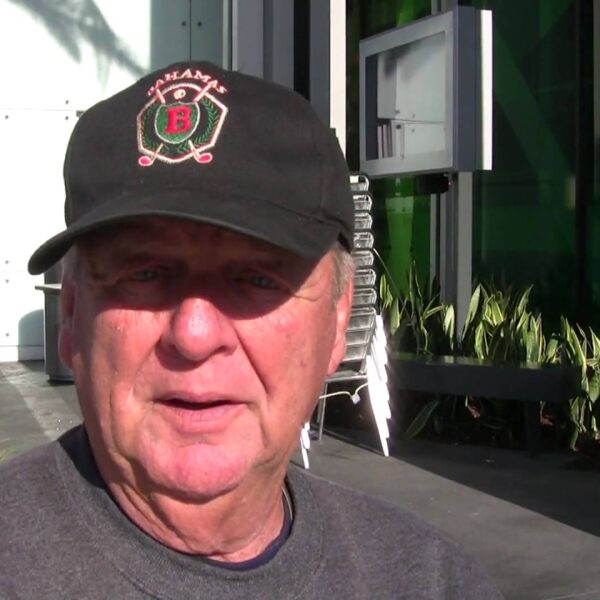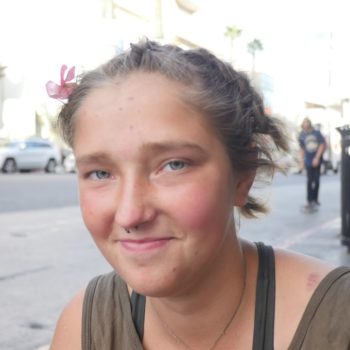In March, the LA-based Services Not Sweeps Coalition celebrated the launch of voluntary cleanup programs at homeless encampments in Hollywood and Venice. The community-led programs aim to model a humane alternative to city-sanctioned sanitation sweeps and rely on cooperation with unhoused street ambassadors.
Listen to this audio postcard recorded at the launch of the pilot program on Vine Street in Hollywood. Hear the voices of street ambassador Double 0, Los Angeles Community Action Network organizer General Dogon, Ground Game LA co-founder Ashley Bennett, and various cleanup volunteers.
Throughout the pandemic, Los Angeles has continued to clear sidewalks, confiscate belongings and displace residents at specific homeless encampments in areas near homeless shelters the city calls “Special Enforcement Zones.”
A coalition of advocacy organizations has condemned those moves against the CDC’s public health recommendations for encampments. Now, those groups are organizing volunteers to clean encampments themselves, modeling a humane alternative to LA’s city-sanctioned sweeps.
Services Not Sweeps – a coalition that includes Ground Game LA and Invisible People – is piloting cleanup programs at two encampments in Venice and Hollywood.
Last month, just before a scheduled encampment sweep, about 30 volunteers gathered near the Goodwill donation center on Vine Street in Hollywood to help the 15 people living there clean and organize their sidewalk campground – and to officially launch the weekly program.
“The community comes out to support and advocate for the residents here, lets them know that nobody should have to leave and be displaced two blocks and move all their worldly belongings, especially during COVID,” said Ashley Bennett, Ground Game LA co-founder. “That’s just inhumane and unhealthy.”
The city declared the area a Special Enforcement Zone in December.
“We started the first day that they did this, three or four months ago when they actually declared the zone,” said Bennett, also a former outreach worker for the Los Angeles Homeless Services Authority (LAHSA).
“That was the first time that we actually convinced them to just do a trash pickup instead of a sweep. Today was definitely scheduled as a comprehensive sweep, but we haven’t even seen them yet. So hopefully, this has worked out.”

Ground Game LA co-founder Ashley Bennett setting up a booth at the recent launch of the community cleanup program in Hollywood. Photo Credit: Aaron Schrank
Bennett said organizers will be out here every Monday until the city agrees the community can take cleanups into its own hands.
“What we’re working toward is regular trash pickup,” said Bennett. “Living in an apartment when you’re housed, you get your dumpster taken out twice or three times per week. That’s what folks here need as well. You’ve got 10-15 people living in an encampment. Things pile up.”
The Emperor of Vineland
The program relies on partnerships with unhoused “street ambassadors,” like a man in his 50s named Double 0, who’s been working with Bennett and others at the Vine Street Encampment since December.
“They call me Double 0 because I became an agent for the citizens of the streets,” he said. “I was always attracted to Hollywood, you know, because I grew up in LA, of course. If you look at it, the view that I get right here, it’s priceless. This is downtown Hollywood, bro.”

Double 0 calls himself “The Emperor of Vineland,” and said he tries to provide a safe community for misfits who are bullied on the streets. Photo Credit: Aaron Schrank
Double 0 became homeless three years ago. After a divorce, he moved back into his mother’s home in Carson, where he grew up. Then his mom moved to Vegas, and Double 0 says he lost his job while scrambling to find somewhere else to stay.
“I’ve been sofa surfing and things like that,” Double 0 said. “But I’m not the kind of guy – because I wasn’t raised that way – to have a handout. I’m more the type that likes to help others.”
Double 0 lived on the streets of Koreatown, then Skid Row in Downtown Los Angeles. Last June, amid the coronavirus pandemic, he set up a tent on Vine Street in Hollywood near the Goodwill donation center, an area he affectionately calls “Vineland.”
Since Double 0 arrived on Vine, he said he’s found odd jobs that help him survive. The owner of the pawnshop beside his tent pays him to keep the alleyway clean. The Goodwill across the street sometimes gives him surplus clothing donations, which he sells from racks on the sidewalk.
“I am the Emperor of Vineland,” Double 0 said. “That’s my little castle right there. I don’t care where you put us humans. We learn to adjust and adapt to our surroundings and make the best of it.”
Double 0 understands that tourists visiting Hollywood don’t want to see homelessness and poverty. But, he said, the city needs to take preventative measures, not simply rely on policing and sanitation enforcement.
“You can’t just arrest us,” Double 0 said. “You can’t just tell us not to do that when you’re not helping us. They have the money. A lot of us want the help, including me. A lot of us are God-fearing and hardworking. And we believe in our system, you know? But does the system believe in us?”
Broken Windows Policing
At the March launch of the pilot program in Hollywood, unhoused organizers came from around the city to show support, including General Dogon, from the LA Community Action Network.
“We need to defund the city clean-up crew and the police in the homeless budget and reinvest that money into housing for the poor,” said General Dogon to a small crowd of volunteers. “That’s what we need.”
General Dogon has been organizing unhoused residents in Skid Row since 2005. He remembers when the city was first sued over its anti-camping laws.
In Jones v. Los Angeles, a federal court found the city guilty of violating the 8th amendment ban on cruel and unusual punishment.
“If you’re a council member or the mayor, and you’ve just been found guilty in federal court, bells and everything else should be going off in your head to tell you, ‘Okay, this is the time for the city to start investing in housing’,” said General Dogon.
“The city didn’t do that. They did the exact opposite, the worst thing that a city could do. They turned around and invested in broken windows policing, and for the next ten years, the city will proceed to police their way out of homelessness. The cleanups ain’t cheap. This shit is costing taxpayers hundreds of millions of dollars. And at the same time, homelessness is going up and up.”

Volunteers clean along Vine Street in Hollywood, where about 15 unhoused residents live. Photo credit: Aaron Schrank
Los Angeles has faced at least six lawsuits over its handling of the homeless crisis. General Dogon said unhoused residents can’t rely on the city to address the problem.
“They need to be put under a federal consent decree,” he said. “Let the feds come in and handle the homeless situation. But can we depend on the feds to do a good job? Who the hell can do a good job? You know who? The people, the community, just like we are here doing it now.”
Volunteers
Community members, who mainly read about the cleanup opportunity online, showed up with rakes, brooms, and garbage bags and cleaned the Vine Encampment in about two hours.
“I wanted to get a little bit more in touch with what’s actually happening in the city, what’s happening on the streets,” said Robin Kong, who drove to the cleanup from Orange County. “This is my first time in a very long time. It’s interesting what happens with social media, what you can find out.”
Kong said he could do this kind of work closer to home, but it’s been helpful to turn to a group that organizes and announces these actions. He hopes to take some of what he’s learned in Hollywood back to his community.
“It’s getting much more expensive for our generation to maintain a standard of living,” Kong said. “What’s happening to some people here, it can happen to anybody. You don’t see this happening in the same way in other parts of the world, and we’re the wealthiest country in the world. It just scares me as to, you know, if this ever happened to me.”
Another volunteer, 22-year-old Travis Crown, said he’s all too familiar with the city’s sweeps.
“I used to be homeless, and so I know that this is such a big problem because as soon as they see anything dirty, the city thinks they can throw away everyone’s tents and everyone’s belongings, forgetting they’re people, and this is where they live,” Crown said.
“It’s like documentation is gone, birth certificates, cell phones, and this is the stuff that people need to get into housing. So yeah, you just gotta let people live.”













